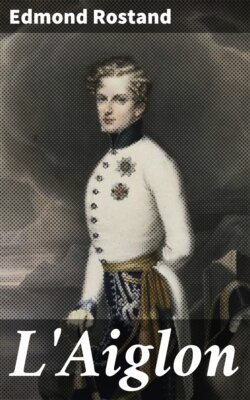Читать книгу L'Aiglon - Edmond Rostand - Страница 3
На сайте Литреса книга снята с продажи.
ОглавлениеTRANSLATED BY
LOUIS N. PARKER
Copyright 1900
By Robert Howard Russell
The First Act The Second Act The Third Act The Fourth Act The Fifth Act The Sixth Act
THE PERSONS OF THE PLAY
The cast as presented by Maude
Adams at the Knickerbocker
Theatre, New York, October, 1900
Table of Contents
| The Duke of Reichstadt, son of Napoleon I. and the Archduchess Maria Louisa of Austria | Maude Adams | |
| Flambeau, a veteran | J. H. Gilmour | |
| Prince Metternich, Chancellor of Austria | Edwin Arden | |
| Count Prokesch | Percy Lyndall | |
| Baron Friedrich von Gentz | Eugene Jepson | |
| The Attaché of the French Embassy at the Austrian Court | Oswald York | |
| The Tailor, a conspirator | William Lewers | |
| Count Maurice Dietrichstein | Edward Lester | |
| Baron von Obenaus | R. Peyton Carter | |
| The Emperor Francis of Austria | Jos. Francœur | |
| Marshal Marmont, Duke of Ragusa | J. H. Benrimo | |
| Count Sedlinzky, Prefect of the Austrian Police | William Crosby | |
| The Marquis of Bombelles, betrothed to Maria Louisa | Clayton Legge | |
| Tiburtius de Loget | William Irving | |
| Lord Cowley, English Ambassador at the Austrian Court | Rienzi de Cordova | |
| Count Sandor | Edward Jacobs | |
| Doctor Malfatti | H. D. James | |
| General Hartmann | Herbert Carr | |
| Captain Foresti | John S. Robertson | |
| An Austrian Sergeant | Lloyd Carleton | |
| A Country Doctor | Frederick Spencer | |
| His Son | Byron Ongley | |
| Thalberg | B. B. Belcher | |
| Montenegro | Morton H. Weldon | |
| The Chamberlain | Charles Martin | |
| An Officer of the Noble Guard, the Emperor of Austria's Bodyguard | Henry P. Davis | |
| The Marquis of Otranto, son of Fouche | Charles Henderson | |
| Goubeaux | Don C. Merrifield | |
| Pionnet | {Bonapartist} | Henry Clarke |
| Morchain | {conspirators} | Thomas H. Elwood |
| Guibert | George Klein | |
| Borowski | Frank Goodman | |
| First Police Officer | Ralph Yoerg | |
| First Archduke, a child | Walter Butterworth | |
| Second Archduke, a child | John Leeman | |
| Maria Louisa, second wife of Napoleon I., widow of Count Neipperg | Ida Waterman | |
| The Archduchess Sophia of Austria | Sarah Converse | |
| Theresa de Loget, sister of Tiburtius de Loget | Ellie Collmer | |
| The Countess Napoleone Camerata, daughter of Napoleon's sister, Elisa Baciocchi | Sarah Perry | |
| Fanny Elssler | Margaret Gordon | |
| Scarampi, Mistress of the Robes | Francis Comstock | |
| Mina, a maid-of-honor | Edith Scott | |
| An Archduchess, a child | Beatrice Morrison |
Princes, Princesses, Archdukes, Archduchesses, Maids-of-Honor, Officers, Noble Guard, Masks (Male and Female), Crotian Peasants, Hungarian Peasant, Austrian Soldiers, Police Officers.
The period covered by the play is from 1830 to 1832.
THE DUKE OF REICHSTADT
FROM THE PAINTING BY SIR THOMAS LAWRENCE
THE FIRST ACT
Table of Contents
L'AIGLON
Table of Contents
THE FIRST ACT
Table of Contents
At Baden, near Vienna, in 1830.
The drawing-room of the villa occupied by Maria Louisa. The walls are painted al fresco in bright colors. The frieze is decorated with a design of sphinxes.
At the back, between two other windows, a window reaching to the ground and forming the entrance from the garden. Beyond, the balustrade of the terrace leading into the garden; a glimpse of lindens and pine-trees. A magnificent day in the beginning of September. Empire furniture of lemonwood decorated with bronze. A large china stove in the centre of the wall on the left. In front of it a door. On the right, two doors. The first leads to the apartments of Maria Louisa. In front of the window on the left at the back an Erard piano of the period, and a harp. A big table on the right, and against the right wall a small table with shelves filled with books. On the left, facing the audience, a Récamier couch, and a large stand for candlesticks. A great many flowers in vases. Framed engravings on the walls representing the members of the Imperial Family of Austria. A portrait of the Emperor Francis.
At the rise of the curtain a group of elegant ladies is discovered at the further end of the room. Two of them are seated at the piano, with their backs to the audience, playing a duet. Another is at the harp. They are playing at sight, amid much laughter and many interruptions. A lackey ushers in a modestly dressed young girl who is accompanied by an officer of the Austrian Cavalry. Seeing that no one notices their entrance, these two remain standing a moment in a corner. The Count de Bombelles comes in from the door on the right and goes toward the piano. He sees the young girl, and stops, with a smile.
